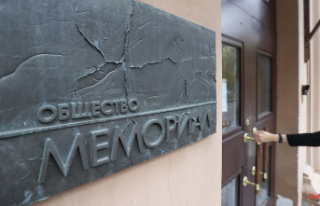Memorial's work also has an impact on Thuringia: Co-founder Irina Scherbakowa researches and teaches in Jena, and the Buchenwald Memorial has worked with Memorial on several projects. So the organization is very happy about the Nobel Prize.
Jena (dpa/th) - Memorial co-founder Irina Scherbakowa sees this year's Nobel Peace Prize as an important signal for the people in Russia who are critical of the Putin regime and his Ukraine war. The decision by the Nobel Committee is a happy event for many of them, Scherbakowa said on Friday evening in Jena, where she is currently a visiting professor. Many people in Russia are afraid of massive repression and police violence. But there will be a time after President Putin, stressed Scherbakova. "I very much hope that Russia will eventually find a way out of this moral, political catastrophe and into democracy and freedom."
The human rights organization was dissolved last year on instructions from the Russian authorities because it is said to have violated the law. The organization campaigned for the politically persecuted and prisoners. And she cleared up the crimes of communist tyranny. In addition to Memorial, the 2022 Nobel Peace Prize was awarded Friday to jailed Belarusian human rights lawyer Ales Byalyatski and Ukraine's Center for Civil Liberties.
The historian and Germanist Scherbakowa now lives in exile in Thuringia. "You have shown how the courage of a few can have an impact on the whole world," praised the President of the University of Jena, Walter Rosenthal. "Thank you for your courage and perseverance."
The world needs Memorial's work as an important symbol for democratic Russia, stated Prime Minister Bodo Ramelow (left). In a letter to Sherbakova, he explained: "With an indescribable commitment, you have campaigned for the organization you co-founded, for human rights in Russia and for the victims of Stalinism over the past decades."
Ramelow stressed that he very much regrets that Memorial has been subjected to repression in recent years and was ultimately banned in Russia. "I very much hope that our university in Jena, albeit a place of exile, will give you the peace and space to continue working on things that are personally important to you."
The Buchenwald and Mittelbau-Dora Memorials Foundation has cooperated with Memorial on several projects over the past decades, for example research into the history of the Soviet special camp number 2 in Buchenwald. The organization is one of the best examples worldwide of a successful historical reappraisal of past injustices of various political systems, explained the foundation's director, Jens-Christian Wagner. The archives and collections they built up made it possible to understand how the Soviet system of injustice worked. The Nobel Prize honors the courageous and committed commitment to a humane, open and peaceful society that is aware of its history.
Sherbakova pointed out that the authorities in Russia continue to take action against their organization. Specifically, it is about the expropriation of premises that were used as a memorial center. She praised the great solidarity that she and her fellow campaigners experienced after the ban from Germany. In Russia itself, too, the work has met with broad support from the population in recent years - especially among young people.
In her estimation, many people in Russia have become more realistic about the war in Ukraine in recent months. She campaigned to help conscientious objectors and give them refuge. "Every person fleeing this war is one soldier less in Ukraine."












